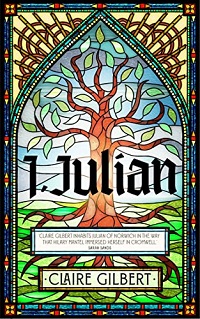In her first novel, I, Julian, Claire Gilbert re-creates the spiritually rich, life-affirming voice of Julian of Norwich, the 14th-15th century mystic whose writings are the first known works by a woman in English. Little is known about the particulars of her life, including her birth name, and Gilbert has filled in the gaps with this marvelous historical reconstruction.
At age 30, having narrowly survived a bout of severe illness, Julian began seeing visions of the Passion of Christ and dedicated her remaining days to soul-searching, prayer, and the sharing of what she glimpsed, realizing the importance of her knowledge for others.
Gilbert imagines a plausible autobiography for Julian, from her quiet childhood with her loving parents in a smallholding outside Norwich, through the tragic years of the Black Plague, the steady encouragement of her mother and others, the terrible grief and guilt she endures, and the transformative experience of her visions, or “showings.” Her words are taken down by a trusted Benedictine monk called Thomas.
It becomes an interesting paradox (addressed in full in the story) that Julian’s physical retreat from the world means complete reliance on others to provide for her needs: food, medical help, and the regular supply of writing materials. The author writes beautifully about Julian's religious life as well as her humanity. Through a window from her anchorhold into the church, she gives her confession and participates in religious services; through a curtained window to the outdoors, she converses with spiritual seekers, friends, her maid, and others whose purpose is less benevolent.
In the late 14th century, the followers of John Wycliffe are amassing, seeking to make the Bible more accessible via English translation, and Julian must tread carefully so as not to be associated with the controversial movement (even while quietly pondering its merits). Throughout her long life, both enclosed and not, Julian remains curious and eager to learn more about God’s feelings toward humankind, which she comes to learn is eternally loving.
Readers of Mary Sharratt’s Illuminations and Revelations (about Hildegard of Bingen and Margery Kempe, respectively) will especially want to pick up I, Julian, and it’s also recommended for anyone interested in the lives of accomplished historical women.
I, Julian was published by Hodder Faith in April in the UK; it will be released next month in the US. You can read more about how the author came to write the book in her interview for Jesus College, Cambridge.
Coincidentally, this morning I received Mary Sharratt's latest newsletter in my email; Julian of Norwich is a character in her novel Revelations. Mary will be participating in the Julian650 lecture series on September 2, presenting a Zoom session (free) on "how her research into women’s hidden histories inspired her to showcase Julian and Margery in her acclaimed novel." See more and register here.





No comments:
Post a Comment